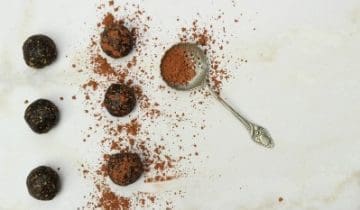Emma Bardwell, registered nutritionist and women’s health specialist, shares her expertise and nutrition tips for menopause and how to prepare through your dietary choices.
Nutrition Tips for Menopause | Emma Bardwell
Perimenopause – the period leading up to menopause – is the perfect time to re-appraise and reset certain aspects of your life. Although often a challenging time, with hormone fluctuations taking their toll on emotional and physical wellbeing, it can be massively beneficial to focus on ways to optimise your health through diet and lifestyle tweaks. Whether you go down the hormone therapy route or not, do not under-estimate the power of nutrition – what you feed your body today has a major impact on how you feel tomorrow. Leading UK nutritionist and Linwoods Health Foods ambassador, Emma Bardwell, shares her best nutrition tips to help women optimise their health and themselves ahead of this natural change in life.
Future proof your health
As much as I want all women to embrace perimenopause, it can feel very difficult to remain upbeat when symptoms are taking hold. The official list of symptoms is long – there are 34 recognised ones – but I think in reality the number is more around the 70 mark.
Common ones include hot flushes, fatigue, mood swings, poor digestive health, insomnia and a tanking libido, but there are many less commonly understood conditions that we simply don’t talk about enough such as itchy skin, tinnitus and burning mouth syndrome.
Whether you experience symptoms or not, it’s important to be aware that the low hormone state that’s brought on by perimenopause puts women more at risk of long-term health conditions like osteoporosis, heart disease and dementia.
Better Bones
With future proofing health in mind, it’s worth pointing out that women have an increased need for certain nutrients during this time to help protect bones, brain and heart. Calcium, magnesium, vitamin D3 and vitamin K2 are all crucial for keeping bones strong.
Including calcium-rich foods like dairy, fortified plant milks, green leafy veg, nuts, seeds and tinned fish like sardines in your diet is a great place to start. You need 700mg of calcium a day if you’re under 50 and 1200mg if you’re over 50. To find out whether you’re close to achieving your target or not, try using an online calcium calculator.
We used to be told to supplement vitamin D only in the winter months here in the UK, but more and more health professionals are advising taking all year round as population levels of this bone essential hormone (yep, it’s actually a hormone, not a vitamin) are so low. If in doubt, get your levels checked with your GP (optimal levels are 70-80 nmol/L). It’s incredibly difficult to get vitamin D though food alone, so fortified products and/or supplementing is advised.
Fighting Fatigue
Low iron can be a cause of fatigue for many women, particularly if they’re expecting longer or heavier periods or eat a vegan or predominantly vegetarian diet. Iron is needed to transport oxygen around the body, with deficiency affecting things like energy, sleep and fitness performance. Ask your GP to check your levels. And if you’re erring towards a plant-based way of eating, make sure you help maximise the absorption of iron in plants by adding vitamin C rich foods to your meals – this might mean eating tomatoes with beans or having a citrus dressing with salads.
Factoring B vitamins into your diet is also important for maintaining good energy levels throughout the day. There are 8 B vitamins in all and a deficiency in any one of them can lead to potentially negative symptoms. For example, very low B12 levels can mimic the symptoms of dementia, we need good levels of B5 to help with reducing fatigue and plenty of B6 to support hormone production.
When your body is under stress, as is often the way during perimenopause, you have an increased requirement for B vitamins and the mineral, magnesium, so do bear this in mind.
Gut Matters
A drop in oestrogen and progesterone can leave many perimenopausal women suffering from changes in bowel habits, particularly constipation. One of oestrogen’s many jobs is to keep cortisol levels low, so when oestrogen levels dip, cortisol – and stress – can rise. This means a slowing down of the digestive process and potentially more bloating, gas and discomfort. The answer for most women is to make fibre a priority. Lots of wholegrains (brown rice, oats and bran flakes), plenty of fruits and vegetables (a recent study showed two kiwi fruits a day made a difference), as well as legumes (lentils and beans), nuts and seeds can provide a perfect source of this.
Make sure to increase slowly – add a few extra handfuls each week – and make sure you hydrate well; your urine should be the colour of pale straw.
Did you know a well-functioning gut can benefit your hormones too? Researchers now think there are certain bacteria (collectively referred to as the estrobolome) that help regulate the amount of oestrogen in your body and which might also impact things like weight, mood and libido.
Although the evidence isn’t conclusive and more studies are needed, one thing is clear: fibre is extremely beneficial for women’s hormone health. Guidelines suggest we need at least 30g a day. Help boost your intake by including vegetables and fruit, together with beans, peas, chickpeas and lentils, walnuts, chia and flaxseeds in your diet.
I know many women find it challenging to eat well at this time of life. Linwoods MENOLIGNA is a seed blend that has been specially developed with the menopause in mind. It contains a wide variety of vitamins, minerals and phytoestrogens (plant oestrogens) in the form of lignans.
It also contains calcium, iron, Vitamins D3, K2 and magnesium, and boasts 6.5g of fibre per serving. Perhaps most importantly of all it tastes great. I recommend sprinkling it on overnights oats, chia puddings and porridge or adding it to shakes, soups and salads.










 No products in the cart.
No products in the cart.